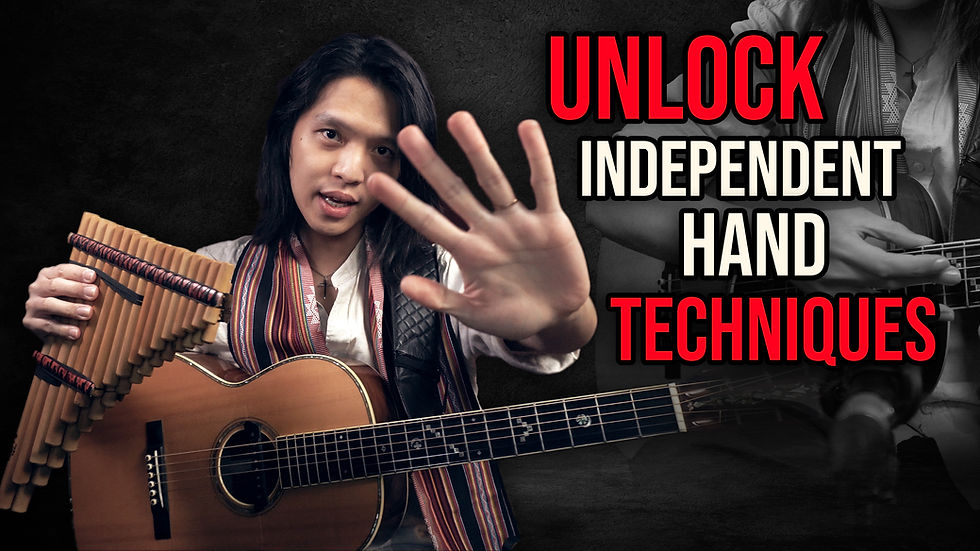Should I Learn Sight Reading for Guitar? (YES... AND HERES WHY!)
- Neil Chan

- Dec 3, 2021
- 3 min read
Introduction
Sight-reading might be one of the greatest fears of contemporary guitarists, and we're always finding reasons to avoid looking at those dreaded notes. But do guitarists actually NEED to learn how to sight-read? In this lesson we'll be unpacking some of the reasons for and against learning to sight-read, and also some helpful suggestions to making the process a lot easier.
Welcome to 'Fingerstyle For The World', my online lesson series where I strive to help guitarists around the world become better musicians.
Before You Begin:
Download my free resources to guide you along!
YES... Learn it! But why?
1: It forces you to develop your musicianship
A great ability that comes with sight-reading is that you will find yourself hearing music in your head before you've even heard it in your ears. Just looking at a sheet of music with your eyes will immediately translate to music in your head.
I'm someone who started my guitar journey refusing to look at notes, but when I did I found this ability almost like a superpower! I felt much more confident and competent as a musician.
How does this work? Well a large part of sight-reading is also sight-singing. As you read notes you're also singing them in your head and out loud. And singing out these notes forces you to have a firm grasp of your scales, intervals, and rhythms. You become much more of a comprehensive musician rather than just a guitarist.
2: You can play music on the spot
This is like another superpower. Once you've gotten decent at sight-reading, you can show up to a gig or party, be handed some sheet music and start playing it IMMEDIATELY! And I don't mean just reading chords, but intricate melodies, riffs, and even solos.
This means that you can not only learn music much faster, but if you are a professional musician you can start taking on lots more gigs as session musicians or last minute shows.
3: Why not?
The art of Western notation has developed over a millennium to reach the intricate, detailed, and accurate form that we have today. We're at a point where we don't need to worry about severe limitations in notation that previous generations were plagued with.
Think of the ancient churches singing plainchant from notations that did not have any accurate form of rhythmic notation. Singers had to simply use the notation to jolt their memory of how the piece flows, but a systemic way of communicating precise rhythms through paper was yet to be developed. This meant that they had to memorise huge repertoires of music.
Today we have notation that can communicate the composer's intentions to such amazing detail, it's like a gift of music that our predecessors have handed down to us. It'd be a shame, in my opinion, not to accept it.
No... and here are some good reasons why.
1: You can't justify the time spent learning it
The truth is, learning sight-reading is incredibly arduous and time-consuming. As amazingly fulfilling and enjoyable as it has been, and I can testify from personal experience, the initial stages were especially gruelling and I just wanted to give up countless times. Having started late on my guitar journey, learning sight-reading felt like I was taking a hundred steps backward. I struggled to sight-read the simplest nursery rhymes while I was playing professional shows at the same time.
We all have limited time on our hands, and I will leave it to you to decide if the benefits of learning sight-reading are a worthy investment of your time. Sometimes what you could achieve working on technique, songwriting, or marketing in the time otherwise spent on sight-reading will be more valuable to you.
2: You just want to play rhythm
Not all guitarists strive to be virtuosos or play lead. Perhaps you are mainly a singer who accompanies herself with some chords, or you are content to be the rhythmic anchor in your band. In all honesty, you don't need to read notes to play chords, and in fact it can be more difficult to do so even as an expert sight-reader.
Think about what your role is as a guitarist and decide whether or not sight-reading is worth investing your time and energy into!
Conclusion
If you ask my opinion, definitely go for it. But bear in mind, I'm a professional full-time musician who loves devoting countless hours studying and practicing music, not just for the practical benefits but also because I really really enjoy doing so. I'm also a huge music geek when it comes to musical culture and tradition, and to leave out music notation in my musical skillset just doesn't add up.
How about you? Let me know in the comments what's your personal decision - to learn or not to learn sight-reading?
Follow along my musical journey on my YouTube, Instagram, Facebook, and website as I share new music videos and lessons each and every week.
Until next time, I'll see you again!
By Neil Chan

.png)




Comments